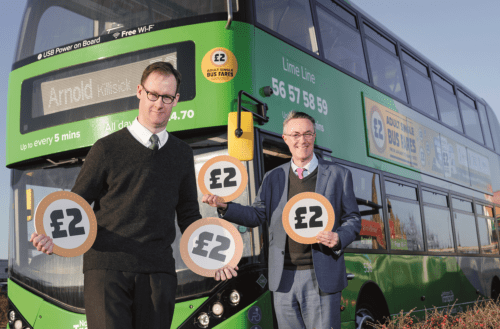
The second interim report into the £2 Bus Fare Cap Second has been published, analysing the initial impact of the cap in January and February 2023, the first two months of the measure. According to the report, the ‘Get Around for £2’ scheme encouraged people to get back on the bus, with almost half of respondents saying the fare cap was the main reason they are using the bus more. Over 50 million single bus tickets were sold in England over January and February 2023, two-thirds of which were capped.
Silviya Barrett from Campaign for Better Transport commented: “We’re pleased the £2 bus fare cap we campaigned for has been a success, reducing fares and boosting passenger numbers. The additional funds for local authorities announced today are also welcome and we hope that this is just the start of ongoing investment in bus networks across the country.”
In phase 1, from January to March this year, 148 operators voluntarily joined the scheme, representing around 90% of the total market in England by patronage, including five large operators (Arriva, Go Ahead, National Express, Stagecoach and First) along with 21 larger small and medium-sized enterprise (SME) bus operators and 72 smaller SMEs. The majority of operators not signed up for the scheme are ones which do not meet the eligibility criteria. Between the first (January to March) and second (April to June) phases of the scheme, operator participation remained largely unchanged. Nine operators withdrew from the scheme and six new operators joined, resulting in a total of 145 operators participating in phase 2.
Continued recovery
The report says that patronage appears to be continuing to recover following the pandemic with early evidence suggesting that the £2 fare cap may be playing a role in the recovery. Analysis of Ticketer data for January and February suggested that year-on-year patronage had increased by 20%. When comparing January and February to the period before the scheme was implemented, using data from October to November 2022 to avoid the Christmas and New Year period, the report says that patronage decreased by 3%, which represents a smaller decrease in patronage than is usually seen during this period of the year.
Although acknowledging that it is currently too early to determine the contribution of the £2 fare cap to any patronage change, the report suggests that indicative signs from previous survey data suggest it is playing a role in increasing or maintaining patronage. An increase in the number and proportion of single bus journeys was reported, and analysis of data shared with DfT by operators suggested that more than 50 million single tickets were sold during January and February, over 34 million (around two-thirds) of which had a previous fare of over £2.
The report also notes that people making additional bus trips with the £2 bus fare cap in place are likely to be existing bus users and make a small number of additional trips, and additional analysis of the data found that of those who reported taking additional journeys, 24% reported that this was less than once per week.
The scheme is perceived as making a positive impact on the cost of living, the interim report concludes. The evaluation will continue over the coming months and provide a full value-for-money evaluation of the scheme in early 2024.
Rural fares fall
The DfT has also released statistics which show that bus fares in rural England have dropped by an average of almost 11% thanks to toe £2 fare cap, with an overall price of bus fares in England outside London dropping by 7.4% between June 2022 and June 2023, mainly due to the extension of the ’Get Around for £2’ scheme.
The average fare has gone down by 10.8% in rural and non-metropolitan parts of England, the figures show, reducing them to a level comparable to 2007 when inflation is taken into account. Roads Minister Richard Holden commented: “Our ‘Get Around for £2’ scheme has slashed overall bus fares for millions across England, as we continue to help people save money on travel, boost transport connections and grow the economy.”
Minister for rural affairs Lord Benyon added: “We are putting the needs of people and businesses in rural areas at the heart of policymaking. Bus services are a vital part of this, as a lifeline for communities and in supporting local businesses in our rural economy. By easing the cost of transport in some of our most remote areas, we can help bring people together and build on the wider work we are doing to help rural communities thrive.”

